There are three science laboratories viz. Physics laboratory, Chemistry laboratory and Biology laboratory. The laboratories are equipped with apparatus, models, chemicals and organic specimens for scientific research and development.
Physics Laboratory


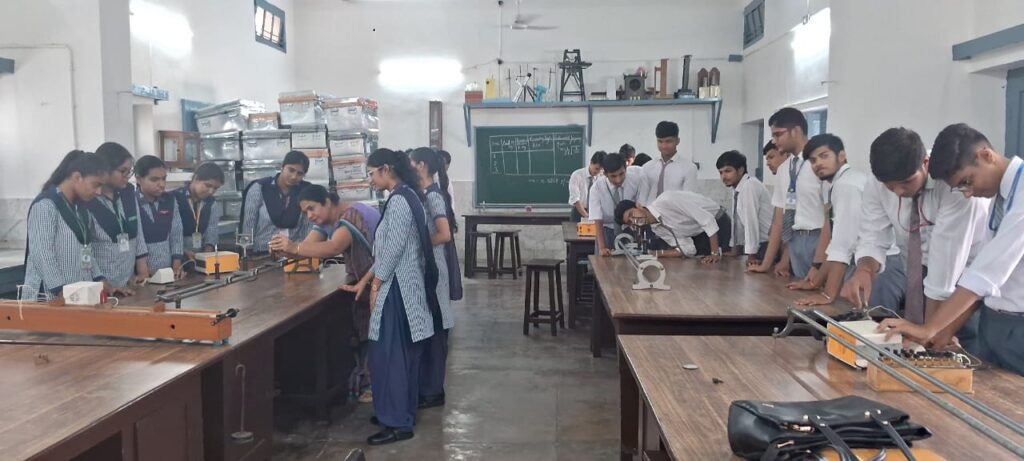

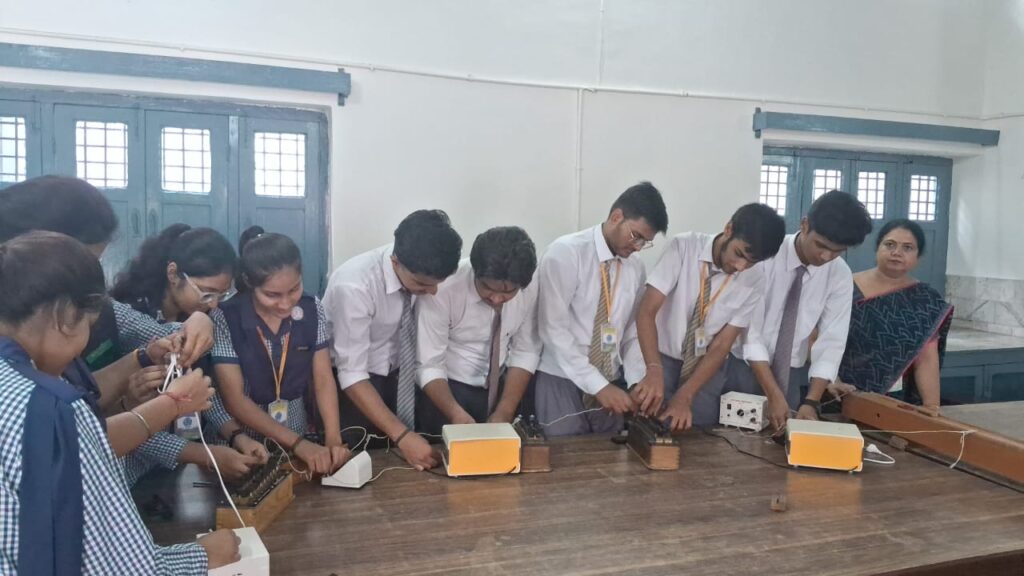

The Physics Laboratory at Asha Modern School is a modern and well-equipped facility that plays a pivotal role in our science curriculum. It is designed to provide students with hands-on experience in exploring and understanding the fundamental principles of physics. The lab is equipped with a wide range of apparatus and instruments, ensuring that students can perform all the experiments outlined in the CBSE syllabus.
Equipment and Apparatus
Our Physics Lab at Asha Modern School boasts a comprehensive collection of equipment essential for a broad spectrum of experiments. Key apparatus includes:
Optical Instruments: The lab is equipped with lenses, mirrors, prisms, spectrometers, and optical benches. These instruments are vital for experiments related to light, including the study of reflection, refraction, and dispersion, as well as understanding the functioning of optical devices like microscopes and telescopes.
Electrical Circuits: To delve into the concepts of electricity and magnetism, the lab includes multimeters, resistors, capacitors, ammeters, voltmeters, and power supplies. These tools allow students to explore Ohm’s Law, Kirchhoff’s Laws, and various types of electrical circuits.
Mechanics Apparatus: The lab features equipment like pendulums, spring balances, inclined planes, and Newton’s Cradle. These are essential for studying the principles of mechanics, including force, motion, energy, and momentum.
Heat and Thermodynamics: With instruments such as calorimeters and thermometers, students can investigate thermal properties and the laws of thermodynamics through experiments that measure specific heat, thermal expansion, and heat transfer.
Waves and Sound: The lab also includes tuning forks, resonance tubes, and wave apparatus for experiments related to wave phenomena and the study of sound.
Activities, Experiments & Educational Values
At Asha Modern School, students actively engage in a variety of experiments and activities that are crucial for their understanding of physics. The Physics Lab is more than just a place for experiments; it is a dynamic learning environment that enriches students’ understanding of the physical world. The hands-on experience gained in the lab is invaluable for several reasons:
Verification of Physical Laws: Students conduct experiments to verify essential laws, such as Ohm’s Law, Hooke’s Law, and the laws of reflection and refraction. These activities involve precise measurements and data analysis, allowing students to confirm theoretical predictions through practical experience.
Collaborative Learning: Many experiments in the lab are conducted in groups, promoting teamwork and collaboration. This environment helps students develop essential communication skills and the ability to work effectively with others.
Development of Scientific Temperament: The lab fosters a scientific mindset by encouraging students to observe, hypothesize, experiment, and draw conclusions based on empirical evidence.
Inspiration for Innovation: The hands-on approach in the lab nurtures curiosity and creativity, inspiring students to think critically and innovatively about real-world problems and solutions.
In conclusion, the Physics Laboratory at Asha Modern School is a vital part of our educational infrastructure, providing students with the tools, skills, and experience necessary to excel in the study of physics. It plays a significant role in shaping not only their academic success but also their overall intellectual development, preparing them for future challenges in higher education and beyond.
Tr Chanda Akash
Chemistry Laboratory


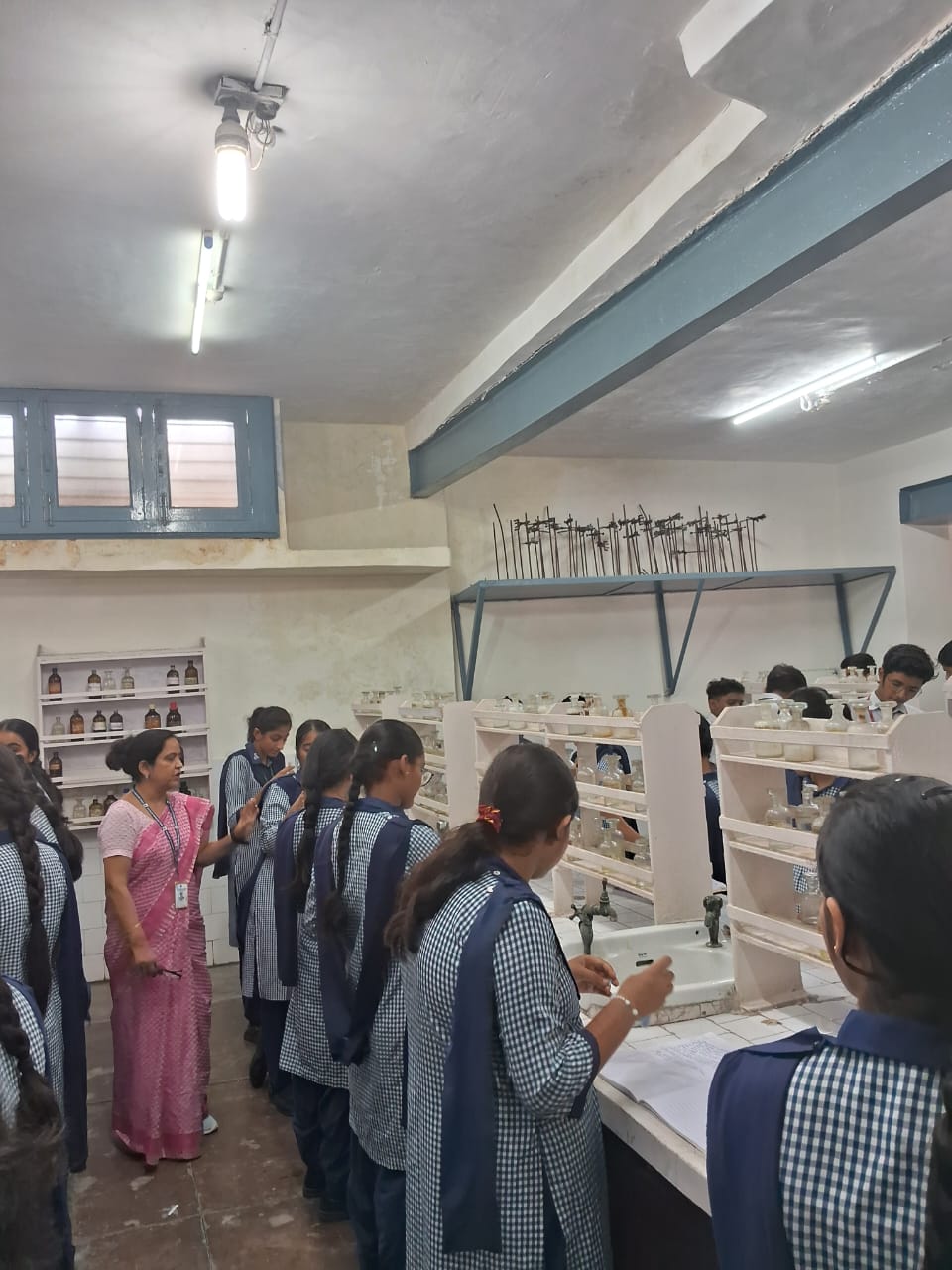
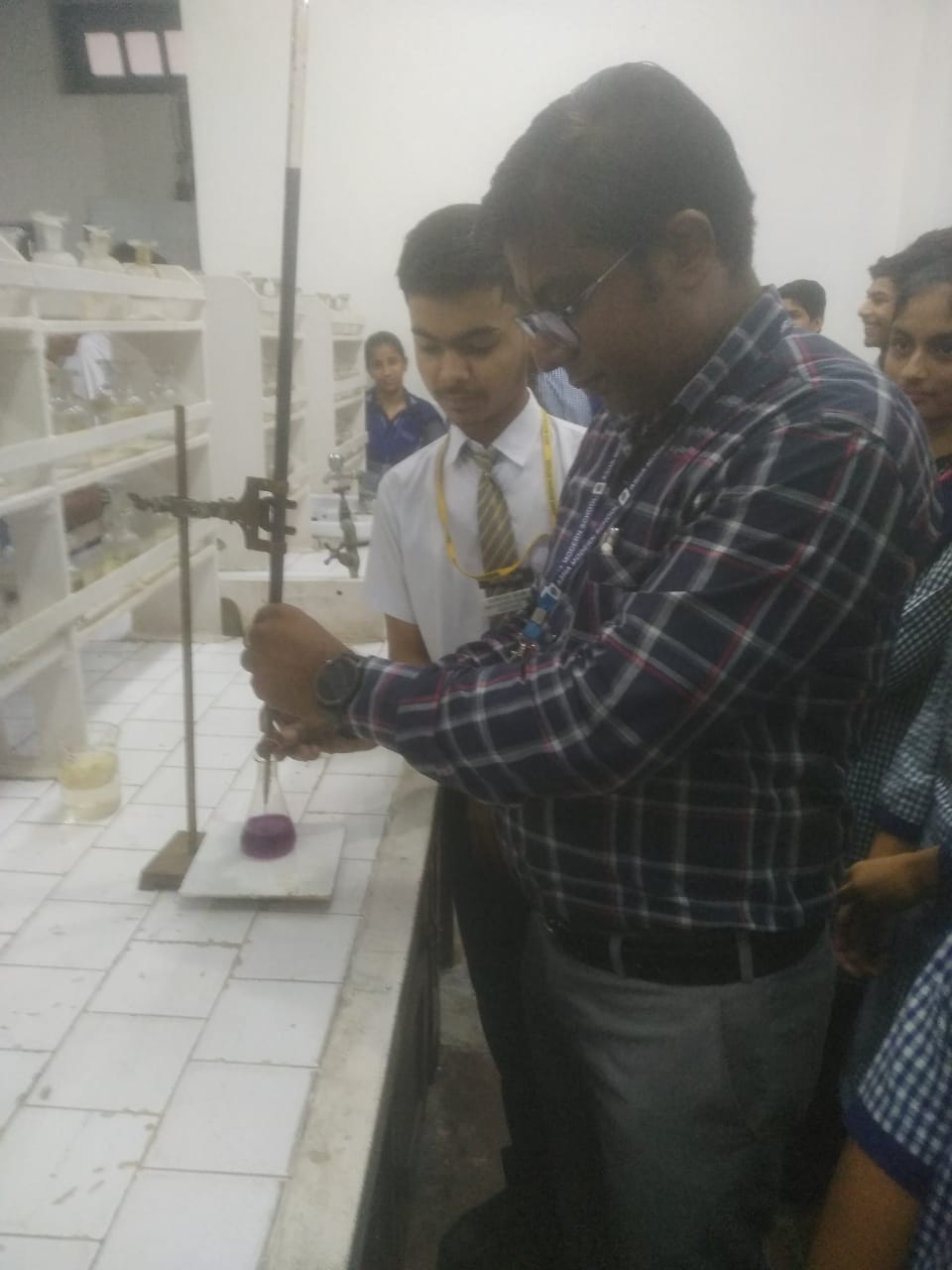

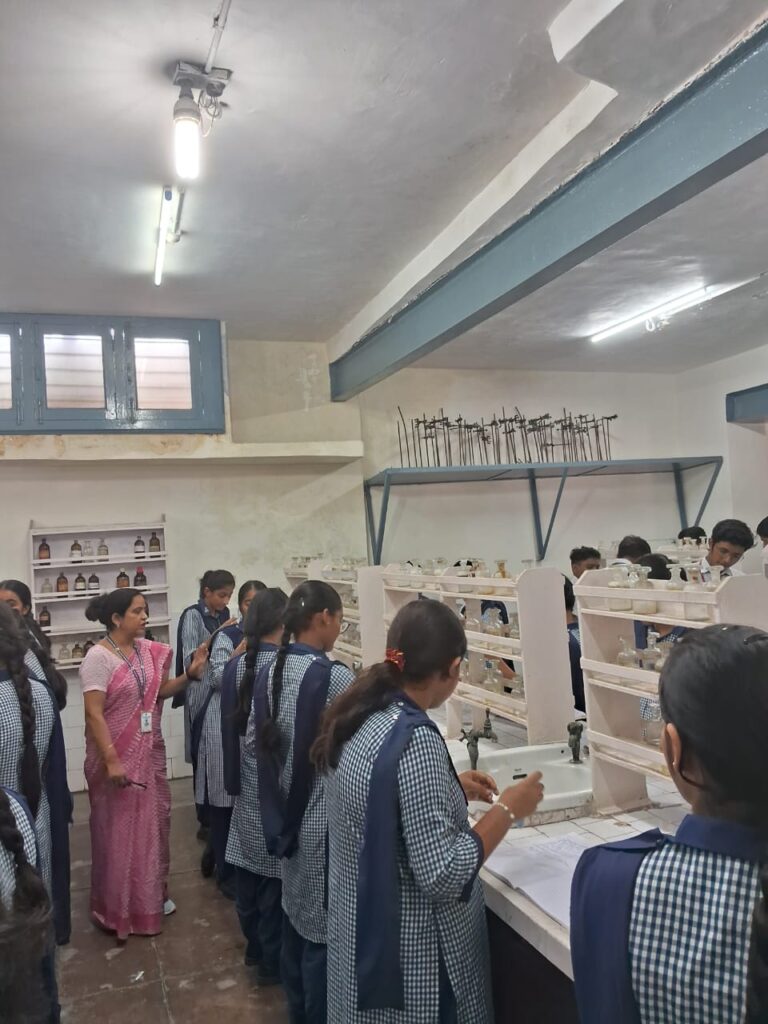
**Chemistry Lab: Unveiling the Mysteries of Matter**
Welcome to our vibrant Chemistry Lab, a place where curiosity fuels discovery and science comes to life. Designed for hands-on exploration and innovation, our Chemistry Lab offers students an immersive experience in the fascinating world of chemical sciences.
**Features of Our Chemistry Lab:**– **Innovative Learning Environment:** Our lab is equipped with cutting-edge technology and modern apparatus, including digital balances etc. Students engage in practical experiments that complement classroom learning, bridging the gap between theory and practice.
**Diverse Experiments:**
From titrations and synthesis reactions to qualitative analysis and various modern experiments, our lab supports a wide range of experiments. Students can investigate the properties of different substances, understand reaction mechanisms, and explore the principles of chemical kinetics and equilibrium.
**Safety and Excellence:**
Safety is paramount in our lab. Students are trained in proper safety protocols and use state-of-the-art safety equipment, including fume hoods, safety goggles, and fire extinguishers. Our lab environment promotes safe experimentation and adherence to best practices in chemical handling.
**Collaborative Exploration:**
The Chemistry Lab fosters a collaborative atmosphere where students work in teams to conduct experiments, analyze results, and discuss findings. This teamwork enhances problem-solving skills and encourages a deeper understanding of scientific concepts.
**Real-World Applications:**
By engaging in experiments that simulate real-world scenarios, students gain insights into the applications of chemistry in various fields, including pharmaceuticals, environmental science, and industry. This practical approach prepares students for future careers and further studies in science.
**Expert Guidance:**
Our lab is supported by experienced faculty who provide hands-on guidance and mentorship. Students receive personalized instruction and feedback, ensuring a thorough grasp of experimental techniques and scientific principles.
**Why Choose Our Chemistry Lab?**
Our Chemistry Lab is more than just a space for experiments; it’s a dynamic learning hub where students develop critical thinking, analytical skills, and a passion for science. Whether investigating the reaction rates, exploring chemical equilibria, or conducting analytical tests, students leave our lab with a deeper appreciation for the role of chemistry in everyday life and the scientific world.
Join us in the Chemistry Lab and embark on a journey of discovery and innovation that prepares you for future scientific challenges and opportunities.
- Dr. Sudhir Garg
- Tr. Rajni Khurana
- Tr. Sushant Kumar Gupta
Biology Laboratory
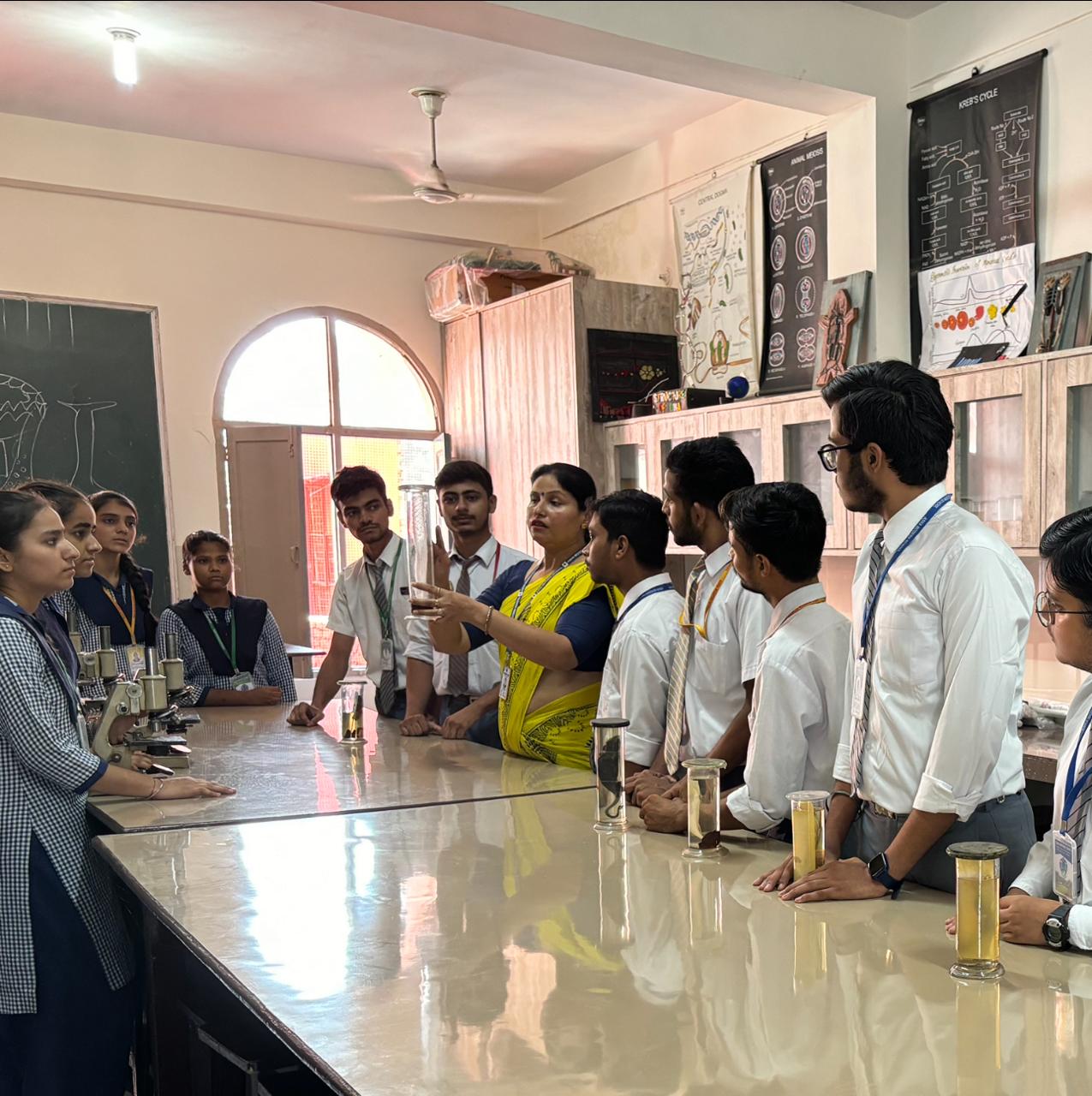
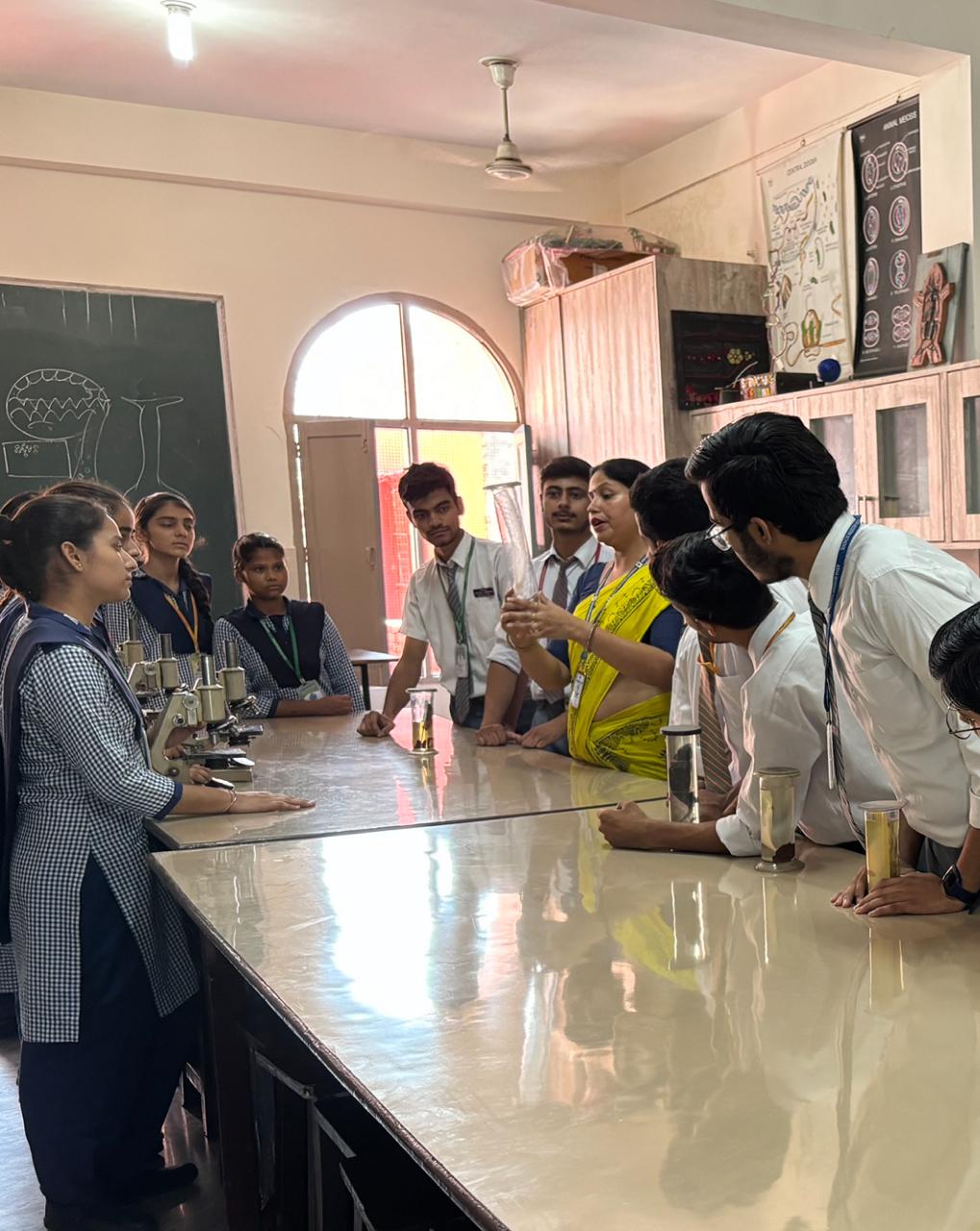




The Importance of a Bio Lab in School
Introduction:
The biology laboratory in schools plays a crucial role in providing students with a comprehensive understanding of biological concepts and processes. It serves as a bridge between theoretical knowledge and practical application, fostering curiosity and a deeper appreciation for the natural world.
Why Bio Labs Matter:
- Hands-On Learning:
- Bio labs enable students to engage in hands-on learning experiences that complement their theoretical studies. This hands-on approach enhances students’ understanding by allowing them to observe and analyze biological phenomena firsthand.
- Development of Scientific Skills:
- Conducting experiments in the bio lab helps students develop essential scientific skills, such as observation, hypothesis formation, data collection, and critical analysis. These skills are foundational for scientific inquiry and problem-solving.
- Fostering Interest in Science:
- Exposure to practical experiments can ignite students’ interest in biology and related sciences, encouraging them to explore careers in scientific research, healthcare, and environmental studies.
- Cultivating Collaboration and Teamwork:
- Working in a bio lab often requires students to collaborate with their peers. This teamwork fosters communication skills and the ability to work effectively in group settings, which are valuable skills in any field.
How Experiments are Conducted in the Bio Lab:
- Preparation and Safety:
- Before any experiment, students are instructed on the importance of safety protocols, including the use of protective gear such as lab coats, gloves, and safety goggles.
- The lab is equipped with essential safety equipment, including eyewash stations, fire extinguishers, and first aid kits, to ensure a safe learning environment.
- Designing the Experiment:
- Students begin by identifying a question or problem they want to investigate. They then formulate a hypothesis and design an experiment to test their hypothesis.
- Teachers guide students in selecting appropriate materials and equipment needed for the experiment.
- Conducting the Experiment:
- Students perform the experiment by following a set of procedures. This involves careful observation, measurement, and data collection.
- Students record their findings in a lab notebook, noting any deviations from the expected results and potential sources of error.
- Analysis and Conclusion:
- After completing the experiment, students analyze their data to determine if their hypothesis was supported or refuted.
- They discuss their findings with classmates and teachers, drawing conclusions based on their observations and data analysis.
Fields of Science Related to Bio Lab Experiments:
- Biology:
- The primary focus of bio labs is the study of living organisms and their interactions with the environment. Experiments may involve studying cell structure, genetics, ecology, and physiology.
- Chemistry:
- Many biological processes are chemical in nature. Bio lab experiments often explore biochemical reactions, enzyme activity, and the effects of pH and temperature on biological systems.
- Physics:
- Understanding the principles of physics is essential for studying biological systems. Experiments may involve examining the mechanics of movement in organisms or the properties of light in photosynthesis.
- Environmental Science:
- Bio labs provide opportunities to study the impact of environmental factors on living organisms. Students may conduct experiments on water quality, soil composition, and the effects of pollutants.
- Microbiology:
- Bio labs offer a platform for studying microorganisms, including bacteria, viruses, and fungi. Students can explore topics such as microbial growth, antibiotic resistance, and the role of microorganisms in ecosystems.
Conclusion:
The bio lab is an indispensable component of science education in schools. By conducting experiments and exploring various scientific fields, students gain a deeper understanding of the natural world and develop critical thinking skills that are essential for future scientific endeavors. The experiences and skills acquired in the bio lab lay the foundation for a lifelong appreciation of science and its applications in everyday life.
Tr Neha Bhardwaj
Math Laboratory


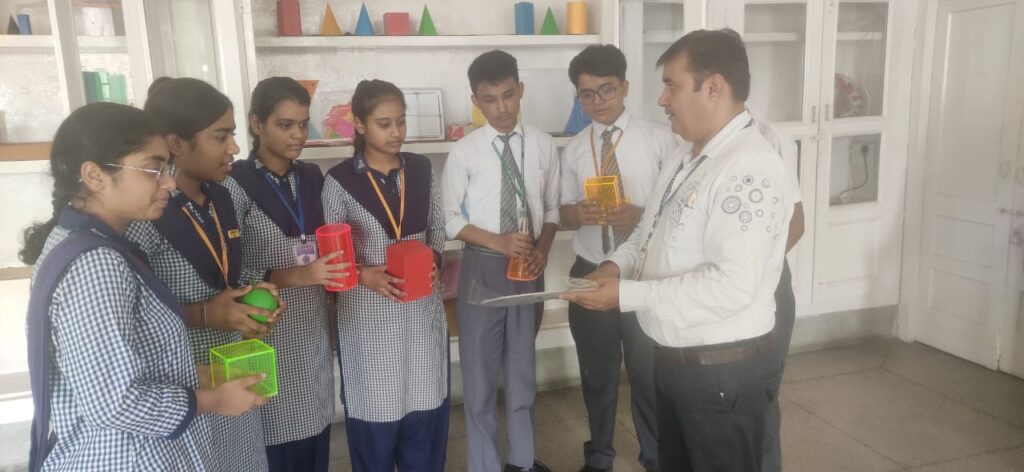
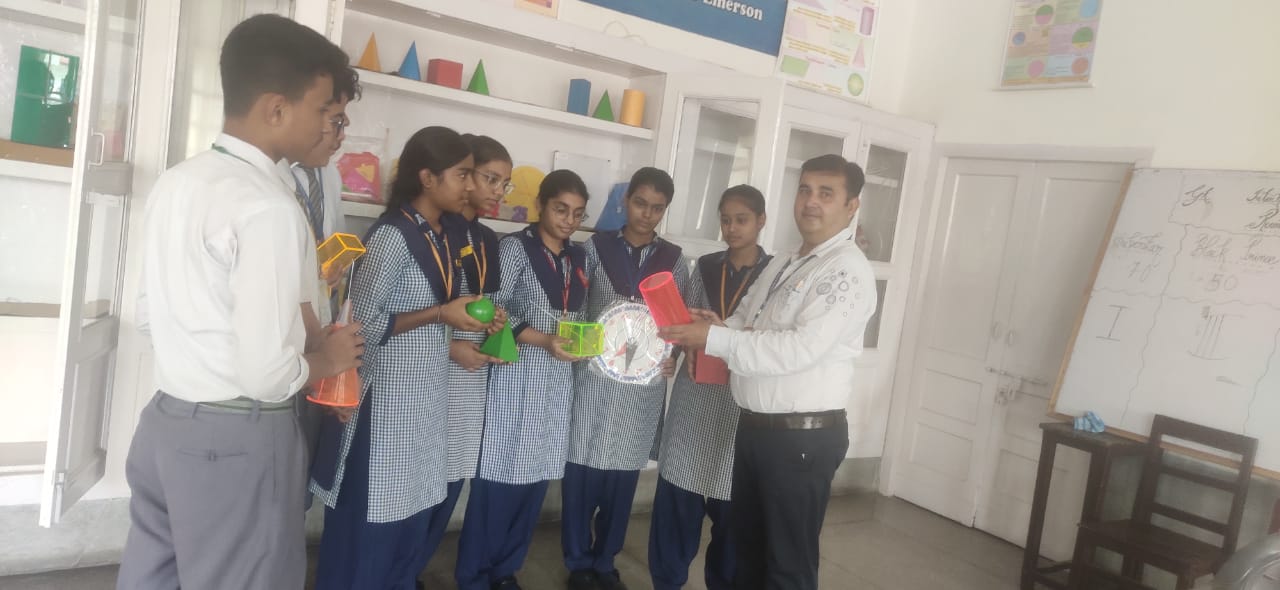
Mathematics composite lab
‘’Maths is the gateway to understand the universe and maths lab is a place where curiosity meets discovery’’
A maths composite lab is a specialised educational environment where students engage with a variety of mathematical concepts and tools. Our school mathematics lab is rich in the elements covering different areas of mathematics such as mensuration kit, 3D models, Nets of different solids, dummy clocks, geometrical stencils and number mat etc. that provides a comprehensive learning experience to the students. The lab encourages active learning and it also helps students to develop a stronger grasp of mathematical concepts and their applications. Students visit the lab regularly and get their knowledge enhanced under the guidance of their efficient teachers.
Tr Deepak Raj

